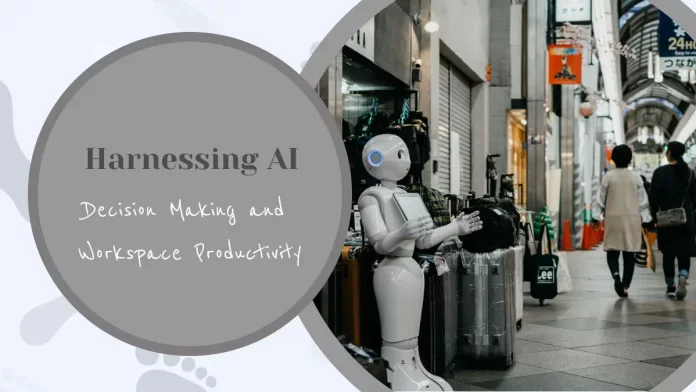In the era of Big Data, companies are inundated with information. The key to informed decision-making lies in making sense of this data. AI can crunch numbers at a speed and scale beyond human capabilities. Through machine learning algorithms and predictive analytics, AI can identify patterns, predict trends, and provide actionable insights. This empowers businesses to make strategic, data-driven decisions.
AI’s predictive functionality makes it an excellent decision-support tool. It allows businesses to look ahead, anticipate changes, and adjust their strategies accordingly. As a result, AI for Decision Making and Workspace Productivity has become an indispensable tool in the contemporary business landscape.
The Mechanisms of AI-Driven Productivity
The role of AI in improving productivity is becoming increasingly important across diverse sectors. By harnessing AI-driven technologies, organizations can streamline processes, enhance efficiency, and optimize resource utilization. AI tools enable companies to automate tasks, analyze data, and make informed decisions, increasing productivity and efficiency. The mechanisms of AI-driven productivity are multifaceted, but the common thread is using AI to enhance efficiency and improve productivity.
Leveraging AI for Improved Decision-Making
Artificial Intelligence (AI) has become a crucial decision support tool, promoting data-driven decisions in contemporary organizations. By integrating AI into their systems, organizations can quickly analyze enormous amounts of structured and unstructured data to identify patterns, trends, and correlations. This AI data handling provides employees and executives with accurate, real-time insights, empowering them to decide for the company’s growth and success. For instance, a marketing team can leverage AI to analyze sales, customer demographics, and social media metrics when launching a new product. The AI algorithms identify hidden correlations and trends, revealing untapped market segments and customer preferences. Thus, the team can create targeted campaigns, optimizing resource allocation and increasing their chances of success.
The Power of Automation and Time-Saving Technologies
Time-saving technologies powered by AI have revolutionized the modern workspace. AI tools such as Asana Intelligence have transformed project and workflow management by automating various tasks. Its features, like its writing assistant and instant summaries, allow teams to focus on their goals rather than mundane tasks. This automation results in better employee productivity and streamlined communication within the team.
Furthermore, with goal-based resource management and self-optimizing workflows, Asana Intelligence ensures resources are used optimally. By automating task allocation and process optimization, AI tools help organizations save time, enhance productivity, and increase their bottom line.
Focusing on Industry-Specific AI Implementations
AI models have been integrated into existing systems across various industries, tailoring AI-powered productivity to industry-specific needs. However, integrating AI into existing IT infrastructure, processes, and workflows presents challenges. Organizations must ensure their systems can support AI capabilities and comply with relevant data protection laws, given that AI often relies on vast amounts of personal and sensitive data. Implementing robust data security measures and transparent communication about data collection practices and privacy safeguards is crucial. Data science and AI-driven solutions like RemoteDesk offer a balance between boosting workforce productivity and safeguarding employees’ privacy. These solutions recognize that each business has unique requirements and can be customized accordingly.
The Positive Impact of AI on Retail and E-commerce Industry
AI-powered tools have made significant strides in the retail and e-commerce industry. Platforms like Shopify leverage AI to generate product descriptions and optimize sales funnels. By collecting and analyzing customer behavior data, marketers can implement personalized strategies such as targeted campaigns and product recommendations. This enhances conversion rates and optimizes decision-making based on customer preferences.
Moreover, AI-powered tools can quickly and accurately analyze large datasets, allowing for faster decision-making and improved return on investment. They can also identify potential issues in sales funnels and guide customers from initial contact to purchase. Thus, AI for decision-making and workspace productivity is revolutionizing the retail and e-commerce industry.
AI-Driven Productivity Enhancements in the Manufacturing Sector
AI has had a profound impact on the manufacturing industry. AI-driven programs analyze machinery data to detect failures, enabling proactive maintenance and reducing downtime. AI-powered robots handle tasks like assembly and inspection, improving accuracy, performance, and efficiency while adapting to their surroundings. This leads to increased efficiency in business processes.
Moreover, AI has revolutionized quality control, with systems identifying defects in real-time, minimizing human error and reducing waste and rework costs. AI also enables the creation of digital twins, virtual replicas used to optimize production lines and allocate resources effectively. These AI-driven advancements have led to better decision-making, improved quality control, and optimized production lines in the manufacturing industry, underscoring the transformative power of AI for decision-making and workspace productivity.
Service Industry Efficiency Through AI Solutions
AI chatbots and virtual assistants have revolutionized customer support by providing real-time engagement and personalized service. These AI solutions address common customer queries, allowing human agents to tackle more complex concerns. Furthermore, AI algorithms for workforce management optimize scheduling and task allocation based on historical data, employee skills, and customer demand patterns. This ensures efficient operations and enhanced productivity. Lastly, AI’s Natural Language Processing (NLP) capabilities enable companies to analyze customer feedback and gain valuable insights to develop targeted marketing strategies.
AI Transforming the Financial Services and Banking Industry
AI’s transformative impact on the financial services and banking sector has been significant, bringing about notable changes in fraud detection, credit scoring, and robo-advisory services. AI algorithms analyze large volumes of transactional data to detect fraud patterns and potential cyber threats, ensuring the security of customer accounts and personal information. Furthermore, machine learning models aid lenders in assessing the creditworthiness of borrowers.
AI-powered robo-advisors have gained popularity among investors seeking portfolio optimization. These platforms collect user data, including financial goals and risk tolerance, to provide personalized investment recommendations based on sophisticated algorithms and market data analysis. As AI and machine learning continue to advance, their impact on industry-specific applications will likely deepen, enhancing productivity, improving efficiency, and delivering greater value to companies and consumers.

The Future of AI for Decision-Making and Workspace Productivity
AI’s influence on decision-making processes and workspace productivity is set to grow in the future. Leveraging AI-powered tools can help companies gain a competitive advantage by automating repetitive and time-consuming tasks, freeing up human workers to focus on tasks that require human creativity and intuition. However, potential biases in AI systems and ethical considerations need to be addressed to ensure fair and ethical standards are maintained.
As companies increasingly rely on AI to answer their frequently asked questions and to automate their decision-making processes, the efficiency and productivity of workspaces are expected to increase. However, the potential of AI must be balanced with ethical considerations, including the treatment of human workers and the potential for bias in AI systems.
Generative AI in Workspace: A Glimpse Into The Future
Generative AI is set to reshape industries, job roles, and the work landscape. As these technologies advance, they will create new opportunities and transform work, making AI for decision-making and Workspace Productivity an increasingly important field.
The Potential Impact of AI on the Future Job Market
The potential of AI technology in the future job market is immense. AI can foster personalization in the workplace, enhancing the employee experience by analyzing individual preferences, work patterns, and skill sets. This personalization can improve job satisfaction, foster continuous growth and development, and offer real-time feedback.
Furthermore, AI can identify skill gaps and recommend targeted training programs, allowing employees to acquire new skills and adapt to evolving job requirements. By leveraging AI, organizations can create individualized learning journeys, enhancing employee engagement and performance. However, it is vital to ensure that AI systems enhance rather than replace human potential, actively including employees in the AI integration process and providing opportunities for upskilling and reskilling.
Eco-Friendly Transformation of Workspaces Through AI
One of the primary ways AI contributes to eco-friendly workspaces is through its predictive functionality, which makes it an excellent decision-support tool for managing resources more efficiently and reducing waste. Furthermore, AI applications in computer vision can monitor energy usage, identify patterns, and suggest improvements. By enabling computers to learn and improve without explicit programming, AI can adapt to changing conditions, optimize energy use, and reduce the carbon footprint. As such, AI for Decision Making and Workspace Productivity is not only a strategic investment for better business outcomes but also a responsible choice for environmental sustainability.

Concluding Thoughts: AI as a Game-Changer in Decision-Making and Productivity Enhancement
Artificial Intelligence not only enhances decision-making processes but also significantly enhances productivity. Integrating AI in the workspace can lead to remarkable improvements in a team’s productivity. For instance, AI tools like ChatGPT can handle mundane tasks and allow employees to focus on more complex tasks. These tools, driven by emotional intelligence, can interact with employees and customers, providing them with timely and accurate information. The automation of routine tasks is one of the areas where AI shines, replacing humans in tasks that are repetitive and time-consuming. This shift allows individuals and businesses to maximize productivity.
